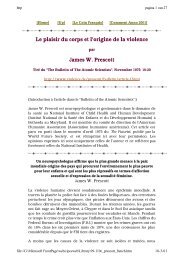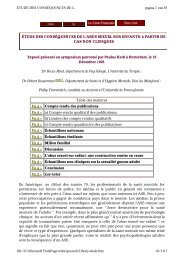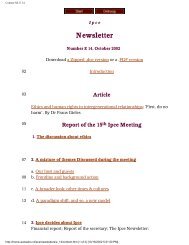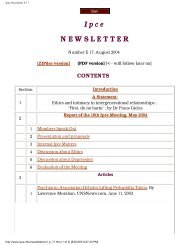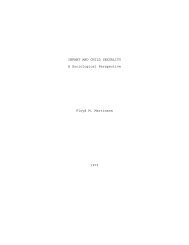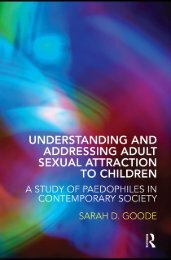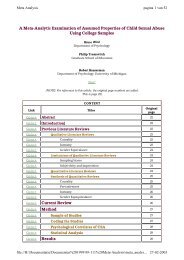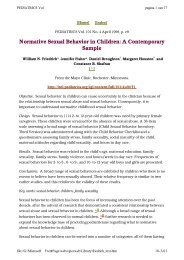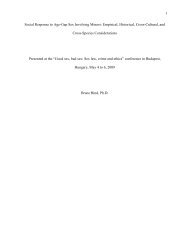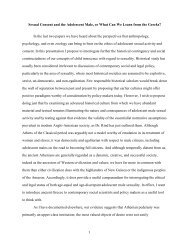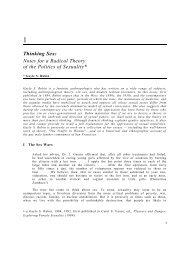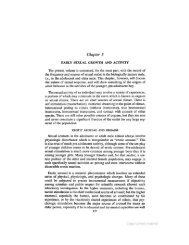Download PDF - Springer
Download PDF - Springer
Download PDF - Springer
You also want an ePaper? Increase the reach of your titles
YUMPU automatically turns print PDFs into web optimized ePapers that Google loves.
338 Ames and Houston<br />
personalities and lower frequencies of antisocial and borderline personalities<br />
than men who agress against adult women (Ames et al., 1987). This finding<br />
supports the stereotype of the weak, passive, socially isolated, and inept man<br />
who turns to children for sexual fulfilment. This stereotype is further supported<br />
by the findings of Wilson and Cox (1983) who interviewed 77 members<br />
of a self-help club for pedophiles in London. Using the Eysenck Personality<br />
Questionnaire these men presented themselves as introverted, shy, sensitive,<br />
lonely, depressed, and humorless.<br />
Men who are involved in incestuous relationships do not present the<br />
same picture of pathology as do men who are involved with nonrelated children.<br />
In constrast to the findings cited above, incest very frequently involves<br />
alcohol abuse (Maisch, 1972; Virkkunen, 1974). Gebhard et al. (1965) reported<br />
that incestuous fathers seldom display diagnosable mental problems<br />
but usually fall at the ends of the spectrum of dominance; some incestuous<br />
fathers are very dominant, others, very passive, with few at intermediate levels.<br />
Even though little agreeement exists in the literature about the nature<br />
of the men who practice incest, agreement is found about the nature of the<br />
family where incest is found. De Francis (1969) reported that the greater the<br />
family disorganization, the higher the proportion of relatedness in cases of<br />
sexual abuse. Along these same lines, Avery-Clark et al. (1981) and Patterson<br />
(1982) have reported that extreme chaos and frequent crisis situations are<br />
often found in incestuous families. They also reported that incestuous families<br />
frequently have high rates of general disorganization and disturbed marital<br />
relationships.<br />
What then can be said about the nature of pedophiles? Given the existing<br />
research, about half of incarcerated pedophiles have themselves experienced<br />
sexual abuse as children. As a group, they are less prone than other<br />
offenders to abuse drugs or alcohol. They often report being sickly as children<br />
and having chronic illnesses. They describe themselves in terms of being<br />
shy and introverted, and they are often given a DSM-III (American Psychiatric<br />
Association, 1980) diagnosis that supports this view they hold of themselves.<br />
THE NATURE OF THE SOCIETY<br />
Societies have dealt with adult/child sex with a great deal of variance.<br />
Even the presumed universal taboo of father/daughter incest has been inconsistently<br />
enforced throughout European and American history (Maisch, 1972).<br />
This legal ambivalence is perhaps a reflection of a social ambivalence about<br />
the appropriateness of adult/child sex.<br />
Societies that practice a form of ritualized homosexuality between men<br />
and boys are usually societies in which women have very low status (Allen,<br />
1984). In addition to holding low status, women in these societies are often<br />
looked upon as a toxic force to be avoided except for procreative purposes



